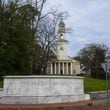Members of the Fulton County a special purpose grand jury that investigated interference in Georgia’s 2020 presidential election recommended that former President Donald Trump and more than three dozen allies be indicted for alleged crimes, more than double the number who were ultimately charged.
The recommendations — which included U.S. Sen. Lindsey Graham, ex-Trump National Security Advisor Michael Flynn and former Georgia U.S. Sens. David Perdue and Kelly Loeffler — were contained in the panel’s final report, which was released in full on Friday. The 28-page document was finalized in January but most of its contents were quickly sealed by a judge at the request of Fulton District Attorney Fani Willis.
Testimony and other information collected by the 23-member special grand jury over nearly eight months helped build the foundation for a separate Fulton County criminal grand jury, which in August handed up a 41-count racketeering indictment against Trump and 18 others.
The special grand jury’s report was meant to function as a non-binding advisory document for Willis, but jurors also requested that it be publicly released. The document shows that the jurors were nearly unanimous in their votes to charge Trump and some of his top advisers, including personal attorney Rudy Giuliani and White House Chief of Staff Mark Meadows.
Among the blockbuster names on the special grand jurors’ list who were not ultimately indicted were Graham, Perdue and Loeffler. The latter two, who were locked in a runoff to hold onto their seats, were pressured by Trump to call for the resignation of Georgia Secretary of State Brad Raffensperger. In response to the news Friday, Loeffler said she refused “to be intimidated by a two-tiered system of justice that seeks to systematically destroy conservatives.”
Graham was of interest due to phone calls he placed to Raffensperger’s office in Nov. 2020, during which he asked about procedures for tossing out absentee ballots. The South Carolina Republican has denied wrongdoing and said he was acting responsibly as the then-chairman of the Senate Judiciary Committee tasked with certifying the election results.
Other names included in the report but not in the indictment were Flynn, Republican activist and former congresswoman Cleta Mitchell and retired libel attorney Lin Wood.
Anthony Michael Kreis, a Georgia State University constitutional law professor who has been closely tracking the case, said there are several reasons why prosecutors might have opted not to seek indictments against some of the people named by the special grand jury.
It’s possible prosecutors felt they didn’t have enough evidence to prove a person’s guilt beyond a reasonable doubt. They could have struck immunity agreements with some, Kreis said, or determined they didn’t want to have long court skirmishes with others, particularly legislators who could cite the U.S. Constitution’s “Speech or Debate” clause.
“Resources are finite,” Kreis said. “You have to make a call at some point, and I think some of these folks just may not have been worth it.”
The grand jury also recommended criminal indictments for former state Sen. William Ligon and Lt. Gov. Burt Jones, though neither has been charged with crimes.
Trump’s legal team aired false allegations about the election and vote counting at Atlanta’s State Farm Arena in front of a state Senate committee which Ligon chaired. Ligon also went to Washington on Jan. 6 to urge Congress to reject Georgia’s presidential electors.
Jones was part of the slate of Trump electors and signed a letter urging Vice President Mike Pence to postpone certification.
A Fulton judge last summer disqualified Willis from investigating Jones, saying the DA had a political conflict of interest. The Prosecuting Attorneys Council of Georgia is weighing whether to appoint a special counsel to see whether Jones should face charges.
The special grand jury met between May 2022 and January 2023, hearing testimony from roughly 75 witnesses and issuing subpoenas for evidence. In Dec. 2022, the jury’s forewoman and deputy foreperson wrote the final report on a special court-issued laptop that wasn’t connected to the internet due to security concerns, jurors previously told The Atlanta Journal-Constitution.
Judges on the Fulton Superior Court examined the final report over the Christmas holiday before agreeing to dissolve the special grand jury in January.
Unlike the final report from the congressional Jan. 6 committee, which was written as a narrative, rich in details of the insurrection and the actions that led to it, the special grand jury’s report is relatively bare-bones. The meat of the document is just nine pages, with a short introduction and then a list of recommended charges. Jurors did not include evidence or their reasoning for why they believed people should be indicted.
The 23 jurors and three alternates organized their recommendations based on sets of events that occurred in Georgia in the aftermath of the 2020 election, including the infamous Jan. 2, 2021, phone call Trump placed to Raffensperger; a set of legislative hearings in which Giuliani and others aired false claims about the vote count in Georgia; and the appointment of a slate of Trump electors in Georgia even though Democrat Joe Biden had won the state.
The report included the jurors’ vote tallies for each person recommended for indictment and footnotes when jurors had separate opinions to share.
The jurors were closely divided over whether to charge the current and former U.S. senators, as well as most of the GOP electors.
Three of the 16 electors were ultimately charged: former Georgia GOP chairman David Shafer, state Sen. Shawn Still and former Coffee County GOP chairwoman Cathy Latham. At least eight others negotiated immunity deals with prosecutors after the special grand jury authored its report.
In February, Fulton Superior Court Judge Robert McBurney released portions of the report, but not the section that detailed who the grand jurors recommended be indicted. He kept those under wraps at the urging of Willis, who said she was concerned about defendants’ due process rights before she went to a regular grand jury to obtain an indictment.
After the criminal charges were handed up last month, McBurney concluded that such an “exceedingly public development” eliminated those due process concerns, at least for the 19 defendants charged in the case, and set the stage for the full report’s release.
In the portions of the report that were previously released, jurors stated that they had unanimously concluded that there was no evidence of widespread fraud in the 2020 election as Trump and his supporters had claimed. And they expressed concerns that some witnesses may have perjured themselves when testifying before the panel, though they did not name names.
One of them appeared to be attorney Bob Cheeley, who was charged with perjury. According to the indictment, he “knowingly, willfully and unlawfully” made false statements before the special grand jury about the meeting of Trump electors in the Georgia Capitol on Dec. 14, 2020.
Jurors voted 20-1 to recommend that Cheeley be indicted for false statements and writings; filing false documents; forgery and other charges.
Jurors also made suggestions with respect to the breach of elections equipment in Coffee County; the harassment of Fulton poll worker Ruby Freeman; and efforts nationally to overturn the 2020 election results in swing states outside of Georgia, as well as Washington, D.C.
The group recommended specific charges against Trump, Giuliani and Perdue in connection to “persistent, repeated communications directed to multiple Georgia officials and employees” between Nov. 2020 and Jan. 2021.
In a footnote, one juror who recommended against indicting Perdue and Loeffler on a racketeering charge, noted that he or she believed they were pandering to their political base but that did not rise to the level of being guilty of a criminal conspiracy.
The only person Willis indicted who was not on the grand jury’s list is Republican operative Michael Roman.
Staff writer David Wickert contributed to this article.









